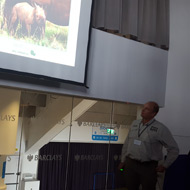South African vets working to save the rhino

The number of rhinos being killed is now greater than the number being born. Unless action is taken to reverse this, extinction is inevitable.
White rhino Thandi was saved by wildlife vets in South Africa after a harrowing attack by poachers left her with serious facial injuries. Thanks to their efforts she has since given birth to a calf of her own.
Wildlife vet William Fowlds shared her story at BSAVA Congress this afternoon (9 April) as he urged delegates to join the fight against poaching.
Thandi and another white rhino Themba were darted with veterinary drugs and had their horns brutally cut off by poachers. Video footage shown during today's session showed the horrific extent of these injuries, as well as the difficulties in treating them.
"We were faced with an injury that, as a profession, we didn't know how to cope with," Dr Fowlds said of his first case of this kind - a six-and-a-half year old rhino that sadly had to be euthanised.
When Themba did not survive despite the best efforts of the veterinary team, the emotional toll was clear to see from the footage. Dr Fowlds said: "We've put him through so much and we haven't succeeded. We haven't been able to give him that life that he deserves."
Thandi, however, did survive and vets performed the first ever skin graft on a rhino.
Poaching has decimated the rhino population, causing a decline of more than 9,000 per cent between 2007 and 2015. In the last decade alone, 5,000 have been lost and the number of rhinos being killed is now greater than the number being born. Unless action is taken to reverse this, extinction is inevitable. Dr Fowlds says poaching must therefore be cut by at least 20 per cent.
Figures suggest white rhino horn is more lucrative than gold or cocaine - worth £43,000-65,000/kg, compared to £30,000/kg for gold and £18,000/kg for cocaine.
Dr Fowlds, who is the Wilderness Foundation Medivet Project co-ordinator, outlined a number of projects are taking action against the wildlife trade, including an effort to improve knowledge and skills in how to treat the injuries of rescued rhinos - an area in which progress has already been made.
Treating this iconic species presents difficulties as vets can only treat animals weighing up to one tonne can be treated in surgery. In rhinos, this is a three and a half year old rhino, so all older animals must be treated in the field.
Dr Fowlds says tracker dogs are playing a key role in the fight against poaching, acting as a deterrent and also helping to apprehend criminals.
Caring for orphaned rhinos is costly both in terms of time and money, however. As well as requiring round the clock care, it costs just under £10,000 to raise a calf from three months to 16-18 months of age.
The project 'Awareness' is another key part of the group's campaign, as it aims to educate people about the consequences of purchasing ivory.
At the end of Dr Fowld's compelling talk, delegates were asked to help put an end to poaching by doing one thing everyday - however small. Ideas included talking to clients and staff about the wildlife trade, sharing stories about poaching on social media to raise awareness, holding rhino events and fundraisers, or implementing a donation system in practice.
For more information, visit: http://savingthesurvivors.org/



 The Veterinary Medicines Directorate (VMD) is inviting applications from veterinary students to attend a one-week extramural studies (EMS) placement in July 2026.
The Veterinary Medicines Directorate (VMD) is inviting applications from veterinary students to attend a one-week extramural studies (EMS) placement in July 2026.